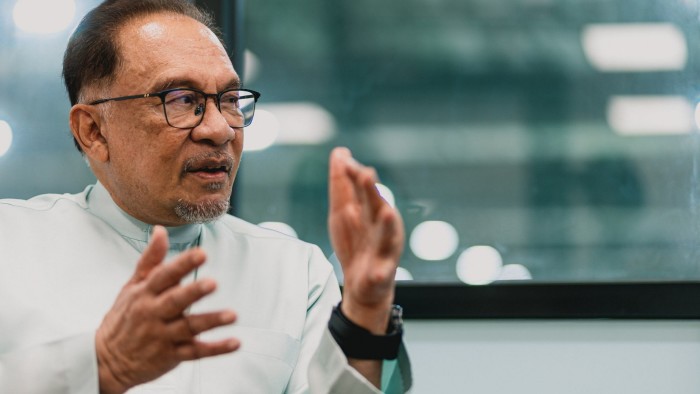马来西亚总理谴责美国和西方盟友的“恐华症”
https://www.ft.com/content/929541ce-32fc-4f5f-9b9e-714b62f6e712?
Mercedes Ruehl 2024 年 2 月 24 日 槟城
安瓦尔·易卜拉欣表示,在寻求半导体供应链投资时,竞争挤压了小国
马来西亚总理安瓦尔·易卜拉欣于 2024 年 2 月 16 日在马来西亚槟城峇都交湾的 Greatech Integration 工厂
安瓦尔·易卜拉欣 (Anwar Ibrahim) 上周在槟城 Greatech 工厂。 马来西亚总理致力于重振因管理不善和不稳定而遭受重创的经济,优先考虑制造业、能源和工业 © Julia Bellack/FT
在东南亚国家应对华盛顿和北京之间紧张局势带来的挑战和好处之际,马来西亚总理谴责了西方日益高涨的“恐华症”浪潮。
安瓦尔·易卜拉欣质疑为什么马来西亚会与其最大贸易伙伴中国“挑衅”,以回应美国对其国家与北京关系的批评。
“为什么我必须被一种兴趣所束缚? 我不认同这种对中国的强烈偏见,这种对中国的恐惧,”他在他的出生地马来西亚北部的槟城接受英国《金融时报》采访时说道。
这位马来西亚领导人的言论突显了超级大国的竞争如何给东南亚各国政府造成了困境。东南亚是一个拥有7亿人口的地区,位于中国的家门口,对美国的印太战略也具有重要的战略意义。
但这种摩擦也为马来西亚、印度尼西亚、越南和菲律宾等国利用与美国和中国的经济、安全和政治关系创造了机会。
安瓦尔表示,官方保持中立的马来西亚寻求“与美国保持良好稳定的关系,同时将中国视为重要盟友”。 他补充说,正如他所说的美国副总统卡马拉·哈里斯在九月份雅加达东盟峰会上提出的那样,他倾向于北京的任何说法“都是不正确的,而且非常不公平”。
安瓦尔是马来西亚五年内的第六任总理,在经历了漫长的政治领导之旅后,于 2022 年 11 月上任。 作为副总理,他帮助国家度过了亚洲金融危机,但他的导师、后来的竞争对手马哈蒂尔·穆罕默德因出于政治动机的腐败和鸡奸指控而两次入狱。 在获得皇家赦免后,他于 2018 年重返公众生活。
作为总理,安瓦尔致力于在多年管理不善和不稳定之后重振经济。 马来西亚2023年国内生产总值增长3.7%,低于疫情后2022年8.7%的繁荣,出口因中国经济放缓而受到影响,令吉汇率跌至20年低点。
作为这一努力的一部分,安瓦尔通常在创纪录的外国投资承诺的帮助下,优先考虑促进马来西亚的制造业、能源和工业部门的发展。 去年安瓦尔访问北京和海南博鳌论坛后,中国国家主席习近平承诺向马来西亚提供估计1701亿令吉(356亿美元)的资金。
几周后,安瓦尔大幅改变了马来西亚的 5G 网络计划,为中国电信巨头华为更多参与铺平了道路。
马来西亚半导体行业利用企业转移供应链来防范地缘政治风险,这一战略被称为“中国加一”。 马来西亚成立了一个工作组,专注于提升半导体价值链,安瓦尔表示,他的政府“高度重视”加强其前端晶圆制造能力。
其中大部分活动都集中在前英国殖民地槟城,是封装、组装和测试等后端芯片业务的重要枢纽。 根据槟州政府非营利机构 InvestPenang 的数据,该州 2023 年前 9 个月的外国直接投资超过 2013 年至 2018 年的总和。
美国芯片制造商美光科技 (Micron Technology) 10 月份表示,将投资 10 亿美元扩大其在槟城的业务,而英特尔 (Intel) 正在该州建设其首个海外先进 3D 芯片封装工厂。
分析师表示,中国芯片集团也一直在增加在槟城的业务,在那里设立或成立合资企业可以让它们避免美国关税并维持与西方供应商的关系。
前华为子公司 xFusion 正在与当地运营商 NationGate 合作,在槟城制造图形处理单元服务器,而芯片封装和测试公司通富微电子则与美国 AMD 集团合作扩大了在该州的工厂。
受到推崇的
对于企业来说,与中国分手很难
安瓦尔表示,他预计美国和中国公司在槟城的融合不会产生冲突,但他补充说,他的政府正在建议当地公司确保他们了解美国的相关政策和法规。
华盛顿多年来一直致力于限制中国
半导体技术的发展,包括先进芯片制造元件和设备的出口禁令。
安瓦尔对哈里斯说:“我们是一个在复杂世界中挣扎求存的小国。” “我想专注于对我们最有利的事情。”
视频:半导体霸主地位的争夺| 金融时报薄膜
Malaysia's prime minister decries 'China-phobia' among US and western allies
https://www.ft.com/content/929541ce-32fc-4f5f-9b9e-714b62f6e712?
Mercedes Ruehl in Penang Feb 24 2024
The FT View The editorial board
Anwar Ibrahim says rivalry squeezes smaller countries as he courts investment for semiconductor supply chain

Anwar Ibrahim at Greatech’s factory in Penang last week. The Malaysian premier has focused on resuscitating an economy battered by mismanagement and instability, prioritising manufacturing, energy and industry © Julia Bellack/FT
Malaysia’s prime minister has condemned a rising tide of “China-phobia” in the west, as south-east Asian countries navigate the challenges and benefits of tensions between Washington and Beijing.
Anwar Ibrahim questioned why Malaysia would “pick a quarrel” with China, its largest trading partner, in response to US criticisms of his country’s ties with Beijing.
“Why must I be tied to one interest? I don’t buy into this strong prejudice against China, this China-phobia,” he said in an interview with the Financial Times in Penang, his birthplace in northern Malaysia.
The Malaysian leader’s comments underscored how the superpower rivalry has created a predicament for governments in south-east Asia, a region of 700mn on China’s doorstep that is also strategically important to the US Indo-Pacific strategy.
But the friction has also created opportunities for countries such as Malaysia, Indonesia, Vietnam and the Philippines to leverage their economic, security and political ties with the US and China.
Malaysia, which is officially neutral, seeks to maintain “good stable relations with the US [while] looking at China as an important ally”, said Anwar. He added that any claim he was leaning towards Beijing, as he said US vice-president Kamala Harris suggested at the Asean summit in Jakarta in September, was “not right and grossly unfair”.
Anwar, Malaysia’s sixth prime minister in five years, took office in November 2022 following a long journey to the political leadership. He helped steer the country through the Asian financial crisis as deputy prime minister, but was jailed twice by his mentor-turned-rival Mahathir Mohamad on politically motivated corruption and sodomy charges. He returned to public life in 2018 following a royal pardon.
As premier, Anwar has focused on resuscitating the economy after years of mismanagement and instability. Malaysia’s gross domestic product grew 3.7 per cent in 2023, down from a post-pandemic boom of 8.7 per cent in 2022, and exports have suffered because of China’s economic slowdown, with the ringgit at 20-year lows.
As part of that effort Anwar has prioritised boosting Malaysia’s manufacturing, energy and industrial sectors, often with the help of record foreign investment pledges. China’s President Xi Jinping committed an estimated RM170.1bn ($35.6bn) to Malaysia after Anwar travelled to Beijing and the Boao Forum in Hainan last year.
Weeks later, Anwar significantly changed Malaysia’s 5G network plan, paving the way for greater participation by Huawei, the Chinese telecommunications giant.
Malaysia’s semiconductor industry has capitalised on companies shifting supply chains to protect against geopolitical risk, a strategy known as “China plus one”. Malaysia has set up a task force focused on moving up the semiconductor value chain, and Anwar said his government was “heavily focused” on strengthening its front end wafer manufacturing capacity.
Much of that activity has focused on Penang, a former British colony that is a crucial hub for back-end chip operations such as packaging, assembly and testing. The state recorded more foreign direct investment in the first nine months of 2023 than in 2013-2018 combined, according to InvestPenang, a non-profit entity of the state government.
US chipmaker Micron Technology said in October it would invest $1bn to expand its operations in Penang, while Intel is building its first overseas facility for advanced 3D chip packaging in the state.
Chinese chip groups have also been increasing their presence in Penang, where domiciling or striking joint ventures allows them to avoid US tariffs and maintain relationships with western suppliers, according to analysts.
Former Huawei unit xFusion is partnering with local operator NationGate to manufacture graphics processing unit servers in Penang, while chip packaging and testing company TongFu Microelectronics has expanded its facility in the state in partnership with US group AMD.
Recommended
Anwar said he did not anticipate conflict from the convergence of US and Chinese companies in Penang, although he added his government was advising local companies to ensure they understood relevant US policies and regulations.Washington has for years worked to restrict China’s development of semiconductor technology, including export bans on advanced chipmaking components and equipment.
“We are a small country struggling to survive in a complex world,” Anwar said he told Harris. “I want to focus on what is best for us.”